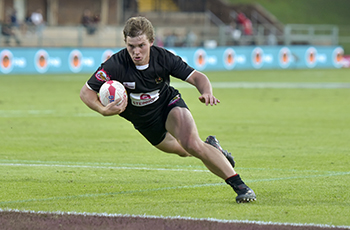
Wian van der Watt scored a try for Vishuis
during the Koshuis final of the Varsity Cup
against Patria. The centre was also crowned
Player of the Tournament in the residence
league.
Photo: Christiaan Kotze/SASPA
The right attitude, a special group of players, and pride to represent their residence. According to Stephen Botha, Vishuis rugby captain, these were the ingredients for his team’s Varsity Cup success as they claimed a fifth national title.
The residence on the Bloemfontein Campus of the University of the Free State (UFS) was crowned Koshuis Champions of the Varsity Cup for a second consecutive year. In a repeat of last year’s final, they beat Patria from Pukke (25-10) on 17 April 2017 in Pretoria.
University continues national supremacy
Abraham Fischer not only staked its claim again as the most successful residence rugby team in South Africa, but also continued the supremacy of the UFS. The university has been national champions seven out of the ten years of the tournament. Armentum and Legatum were also champions.
“I always say that whoever wins the final of the residence league here, will probably win the Varsity Cup,” Botha says.
Team prepared for finals rugby
He attributes the success to his team’s positive attitude. “Even when we were doing fitness, the guys never complained and never asked how much more we have to do. They just did it."
“I always say that whoever
wins the final of the residence
league here, will probably win
the Varsity Cup,” Botha says.
Vishuis never seemed under too much pressure in the final. Their forwards laid a solid foundation, having the upper hand in the scrums, line-outs, and driving mauls. Although Vishuis is renowned for running rugby, Botha says his team prepared for finals rugby. “We decided to stick to the basics and not to play too risky.”
However, they lost their last league match against Sonop from Tukkies (21-23). Botha agrees that it might have been the right thing before the final. “Like I always say: ‘Every setback is a set up for a great comeback’”.
• Vishuis centre Wian van der Watt was chosen as the Koshuis Player of the Tournament, while two Shimla flankers, Daniel Maartens and Phumzile Maqondwana, were included in the Varsity Cup Dream Team.